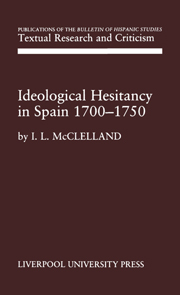Book contents
- Frontmatter
- Contents
- Dedication
- Preface
- CHAPTER 1 Reason of Unreason in the Spanish Vulgo
- CHAPTER 2 The False Alarm of ‘Scepticism’
- CHAPTER 3 The Vulgo-Conception of Scientific Evidence
- CHAPTER 4 The Psychological Significance of Pulpit Oratory
- CHAPTER 5 Witness of the Popular Stage
- CHAPTER 6 The Disturbing Effects of the Periodical Press
- Index
CHAPTER 6 - The Disturbing Effects of the Periodical Press
- Frontmatter
- Contents
- Dedication
- Preface
- CHAPTER 1 Reason of Unreason in the Spanish Vulgo
- CHAPTER 2 The False Alarm of ‘Scepticism’
- CHAPTER 3 The Vulgo-Conception of Scientific Evidence
- CHAPTER 4 The Psychological Significance of Pulpit Oratory
- CHAPTER 5 Witness of the Popular Stage
- CHAPTER 6 The Disturbing Effects of the Periodical Press
- Index
Summary
For at least the first two decades of the eighteenth century the Spanish Periodical Press did not act as a direct disturber of established ideas, and, in the next decade, the clandestine El Duende de Madrid (The Madrid Elf), dealing with political matters, circulated too privately to be more than privately influential. Branches of free-range journalism directed to the general public had not yet taken organized form. The conception of the Periodical Press was that of state-controlled, reporting newspapers, or, for instance, of astrological almanacs, also regarded by the general reader as unquestionable reports of fact. So far public journalism had not been diverted into grey, side-areas of debatable supposition, and, therefore, unease; and the Periodical Press in general had not yet developed ideological character, least of all critical individuality. Analytical journalism, both subjective and objective, and which the general public was not yet trained to assimilate, was to emerge, provocatively, from outside regular sources of state pronouncements.
Strict state-censorship of the early decades, from 1701, confining the weekly Gaceta de Madrid, and, by extension, its provincial counterparts, to approved news-items, was a natural war-time and post-war precaution. In these newspapers the statements of politically national news are paternally concerned with Spanish successes in war, or with the health, movements and activities in general of the Royal Family. They refer to incidents such as the King's warm welcome to the Jacobite Pretender, the signing of the Quadruple Alliance Treaty, the decision to remove Alberoni from power in the interests of peace.
- Type
- Chapter
- Information
- Ideological Hesitancy in Spain 1700-1750 , pp. 138 - 147Publisher: Liverpool University PressPrint publication year: 1991

